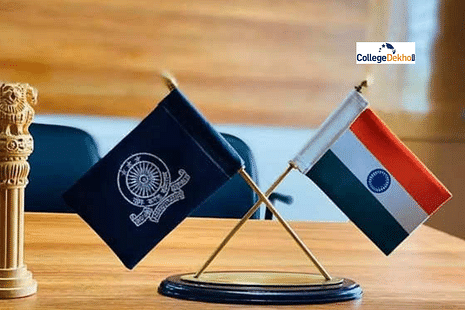
Picking one of the
Best Graduation Subjects for IAS after 12th
is the first step to effective preparation for the UPSC CSE exam. If a candidate ends up choosing their graduation subject as the optional subject for the IAS exam, around 20%-30% of the
UPSC CSE syllabus
usually gets covered. Moreover, two of the nine papers in the UPSC Mains Exam — GS VI and GS VII — are dependent on the optional subject.
The UPSC Mains optional exams carry 250 marks each, for a total of 500 marks. The marks secured in exams are used to determine the merit list. One must also note that the optional subject cannot be changed once the UPSC application form has been submitted. Hence, it is imperative for aspirants to pick the right graduation course after 12th.
Listed below are the best graduation subjects after 12th for UPSC preparation along with the factors one must consider while choosing a graduation course and more.
Also Read:
UPSC CAPF Recruitment 2023
Best Graduation Courses for IAS after 12th
There is no one degree that can ensure success because the UPSC CSE exam depends on the candidate's abilities and weaknesses as well as their areas of interest. Many top performers have claimed that a candidate's undergraduate degree and optional subject selected for the UPSC IAS Main Exam are inextricably linked. However, a candidate's interest in the subject matters even though there isn't a single optional subject that can guarantee success on the exam.Previous year data indicates that the best degree programme for the UPSC is a Bachelor of Arts degree, which is what the majority of applicants opt to pursue in order to pass the UPSC CSE exam. It has been noted that candidates from these streams do well on the examinations. If the applicants hold a degree in the humanities stream, they are at a distinct advantage. However, students with engineering backgrounds and degrees who have recently taken the IAS exams have also performed well. Check out the list of best graduation courses after 12th for IAS:
| List of Best Graduation Courses for IAS after 12th | ||
|---|---|---|
| Agriculture | Geography | Physics |
| Animal Husbandry and Veterinary Science | Geology | Political Science & International Relations |
| Anthropology | History | Psychology |
| Botany | Law | Public Administration |
| Chemistry | Management | Sociology |
| Civil Engineering | Mathematics | Statistics |
| Commerce & Accountancy | Mechanical Engineering | Zoology |
| Economics | Medical Science | Literature |
| Electrical Engineering | Philosophy | - |
Top 6 Graduation Subjects to Become an IAS Officer
Out of the ones mentioned above, we have handpicked a few based on previous-year analysis:
- Political Science: It forms a major part of the GS Paper 2 syllabus apart from it being one of the optional courses.
- Public Administration: Public Administration also forms a part of the GS Paper 4 syllabus. Also, similar to Political Science, Public Administration plays a crucial role in GS Paper 2.
- History, Sociology, or Geography: Given that the GS Paper 1 syllabus includes History, Sociology, and Geography, choosing one of these can be a smart choice.
- Economics: Both the optional subjects and GS Paper 3 syllabus comprise Economics, making it one of the top choices for graduation courses for IAS after 12th.
Top 10 Most Chosen UPSC CSE Optional Subjects
Although selecting an optional subject for the UPSC CSE is a personal decision, analysis has shown that aspirants tend to favour the following options. If you're having trouble choosing among 26 subjects, consider the following list of the top 10 most chosen UPSC optional subjects:- Sociology
- Law
- Psychology
- Political Science
- Agriculture
- Literature
- Anthropology
- Public Administration
- Geography
- History
Also Read: UPSC Prelims CSE Passing Marks
Graduation Degree of Past UPSC IAS Toppers
To make the search further easier, let us take a look at the list of the top 10 UPSC IAS toppers from the previous ten years along with their chosen optional subjects and graduation degrees:| Topper | Year | Graduation | Optional Subject |
|---|---|---|---|
| Shruti Sharma | 2021 | BA History | History |
| Shubham Kumar | 2020 | BTech in Civil Engineering | Anthropology |
| Pradeep Singh | 2019 | BTech Computer Science | Public Administration |
| Kanishak Kataria | 2018 | BTech Computer Science | Mathematics |
| Anudeep Durishetty | 2017 | BTech in Civil Engineering | Anthropology |
| Nandini KR | 2016 | BTech in Civil Engineering | Kannada Literature |
| Tina Dabi | 2015 | BA Political Science | Political Science |
| Ira Singhal | 2014 | BTech Computer Science | Geography |
| Gaurav Aggarwal | 2013 | BTech Computer Science | Economics |
| Haritha V Kumar | 2012 | BTech Electronics & Communication | Economics and Malayalam |
Factors to Consider While Choosing UPSC Optional Subject
When selecting an Optional Subject for UPSC CSE, a number of different factors, including personal preference, the accessibility of UPSC study materials, the nature of the syllabus, educational background, and many others, are important to consider. Read through some of the factors you can take into account when selecting from the list of optional subjects for the UPSC:1. Subject Knowledge: The subject that a candidate studied for their graduation should be taken into account while choosing an optional subject in the UPSC CSE. Choose the graduation subject, if it is on the list of optional subjects, without hesitation. One must be familiar with the basics of the subject, and this is an added benefit for improving the candidate's preparation.
2. Similar to General Studies Subject: Choose the optional subject that is also covered in the UPSC CSE Prelims Exam in case none of the subjects you studied in college matches the list of available optional subjects for UPSC CSE. This will save time and effort by preventing one from having to learn a new topic. Geography, History, Sociology, Economics, Law, Political Science, and Public Administration make up the majority of the pertinent disciplines that are covered in both Prelims and Optional. Choosing between philosophy and agriculture could also be an intelligent choice.
3. Volume of Syllabus: As candidates may be aware, the syllabus is fairly extensive and complex, thus selecting an optional subject with a sizable syllabus may not be the best option. It takes more time to cover a big curriculum, which is not a viable strategy.
4. Study Material Availability: This is the most vital and significant criterion that a candidate should not ignore while selecting their optional subjects. Make a short list of the subjects for which they can quickly find study materials and resources, and then pick one from the list.
As mentioned before, there is no best undergraduate programme for UPSC candidates. Even though there are some subjects that are considered more scoring than others, many IAS toppers have scored 320+ in both technical and non-technical subjects. As a result, candidates should pick a degree programme in which they are interested and confident that they can succeed.
For more such informative articles on UPSC CSE, stay tuned to CollegeDekho!
Are you feeling lost and unsure about what career path to take after completing 12th standard?
Say goodbye to confusion and hello to a bright future!

Was this article helpful?




















Similar Articles
TG TET Hall Ticket 2026 Download Link Activated, Subject-wise Exam Schedule
Simple Interest and Compound Interest for AFCAT
CBSE Class 12 Previous Year Question Papers 2025: Download PDF
TG TET 2026: Exam Date, Hall Ticket (Dec 27), Syllabus, Result
KARTET Result 2025 (Out): Direct Link, Qualifying Marks, Steps to Download KARTET scorecard, certificate
CTET Application Form Correction February 2026 (Starts): Direct Link, Instructions, Do's and Dont's